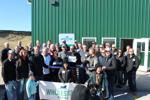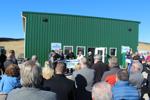
Wholestone’s butcher shop sits on a site being prepared for a $500 million facility capable of processing 6 million hogs a year. Whether it will be built is up to voters in Sioux Falls.
Source:
he fate of the new Wholestone pork processing plant in Sioux Falls will be up to voters, but pig farmers who are part owners in the company tout its convenient location and modern design as the solution to providing food for a growing population.
Wholestone Farms cut the ribbon Oct. 25 on a butcher shop that will provide custom processing of hogs marketed directly to consumers. Behind the building with green steel siding, land is cleared for a larger construction project, Wholestone’s $500 million plant capable of processing up to 6 million hogs a year.
The ribbon cutting ceremony took place two weeks ahead of the Nov. 8 vote on whether new meat processing facilities are allowed in Sioux Falls city limits. By opening the small butcher plant, Wholestone could possibly skirt any such moratorium and expand the small shop into the large commercial processing plant the company originally intended.
Wholestone announced plans for the butcher shop in July as a group in opposition to the large-scale pork plant gathered signatures to get the matter on the ballot.
Luke Minion, chairman of the board for Wholestone Farms and for its parent company, Pipestone Holdings, said at the ribbon cutting that the issue has polarized the community, and that Wholestone has followed the rules.

A large crowd, including several farmer-owners, gathered on the sunny October morning outside the butcher shop for the ribbon cutting sponsored by the Greater Sioux Falls Chamber of Commerce. Third generation farmer Seth Spronk spoke on behalf of farmers, telling how pig farming allowed him to come back to the family farm and he hopes to continue to farm for the rest of his life.
“This is one of the keys to being able to do that,” he said of the pork plant.
Having a new, state-of-the art facility for processing hogs is what the industry needs, according to Kevin Carlson, who is part owner in a sow farm near Rock Rapids, Iowa. His son handles a feeding operation near Adrian, Minnesota, and they currently sent their hogs to Wholestone’s plant in Fremont, Nebraska. The cost of trucking the animals there is three times what it would be to send them to Wholestone’s proposed Sioux Falls plant for processing, Carlson said.
“We’ve been very excited to get this plant on the ground and built,” he said.
While opponents cite concerns about odor from the plant, Wholestone has promised the use of the latest technology keep smell at a minimum. In the face of that and other new technology, Carlson said he thinks old plants like Smithfield’s in Sioux Falls will eventually be obsolete.
“If we’re going to feed the world, we will need processing plants, and new ones benefit not only the area but farmers raising livestock,” he said.
The hog industry has grown in South Dakota, said South Dakota Pork executive director Glenn Muller, and Wholestone has stepped up to answer the need for processing.

Sioux Falls is the right place for a large plant, according to Muller. The city evolved around the Falls Park area, which was once home to Zip Feeds, the Sioux Falls Stockyards and is still bustling with Smithfield’s pork plant, he said, and the new facility is what Sioux Falls needs to develop as an industrial base.
The Wholestone plant is proposed in an area of northwestern Sioux Falls zoned for large industrial businesses, pointed out Adam Krause, who raises pigs near Clear Lake, South Dakota, and serves as first vice president on the South Dakota Pork Producer Council executive board.
“We have zoning boards for a reason,” he said.
Krause is a contract feeder for the entity while his dad, Laron Krause, is part owner. They currently send some of their hogs for processing at the Fremont plant. Krause said the plant there is easy to get to with access just off the freeway. Likewise, the Sioux Falls plant would be located off of the Interstate 229 Benson Road exit.
Most of all, he sees the processing capacity as a benefit to the industry.
“Still fresh on the mind of everyone is COVID,” he said. “It’s not long ago there were empty shelves at Hy-Vee.”
Large meat processors, including Smithfield, shut down in the spring of 2020 when COVID spread among workers. Farmers were left with nowhere to bring pigs that were ready for slaughter. Some turned to custom processing at small butcher shops, and buying meat directly from farmers has remained a popular option for consumers who want to know how their food was raised. Wholestone is tapping into that trend with its butcher shop.
“We’re going to be happy to sell you a pig,” Minion told the crowd outside the little green building. “We’re going to make a connection to you and these farmers. We’re going to act small and local at the same time we act big and global.”





